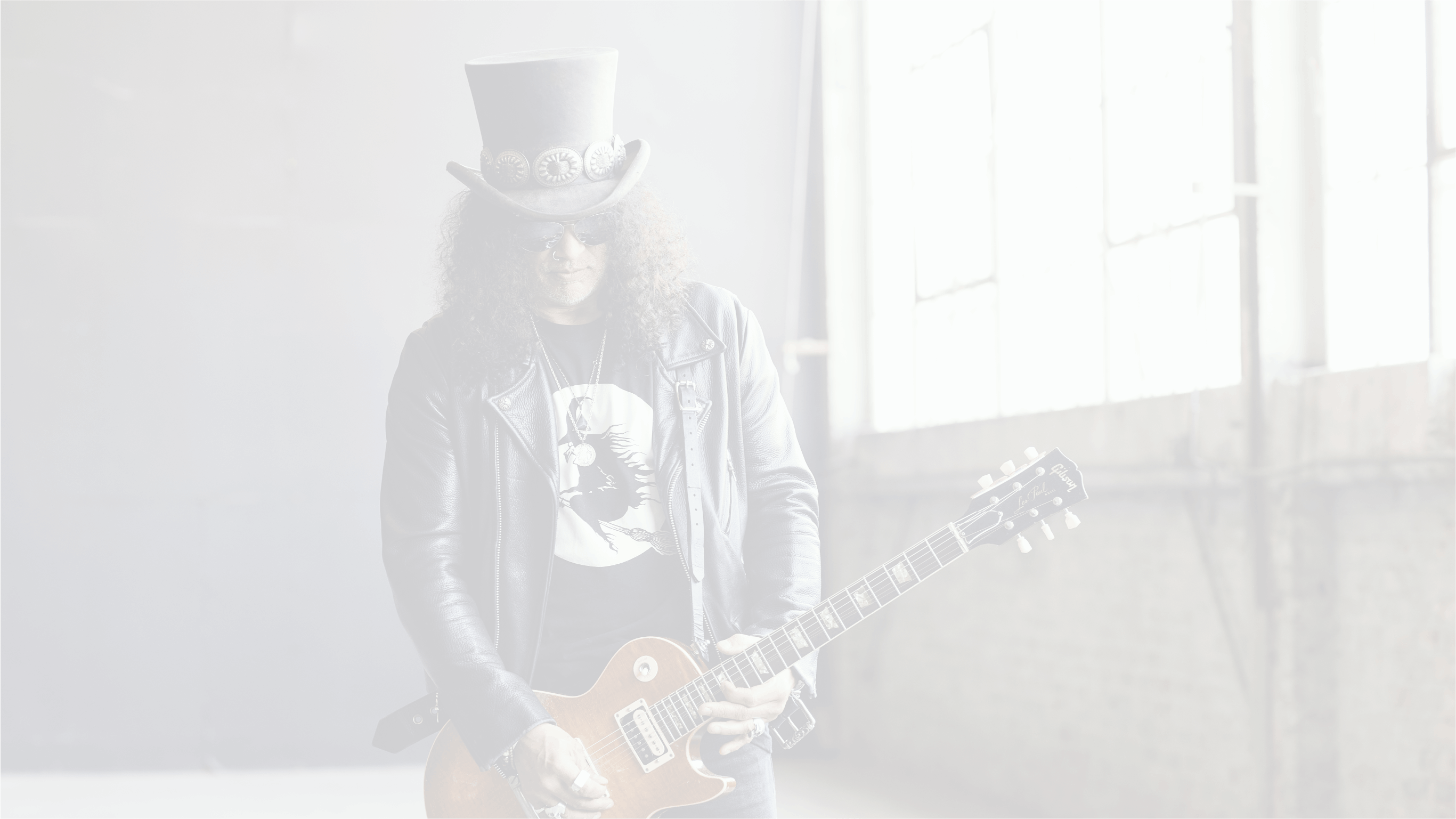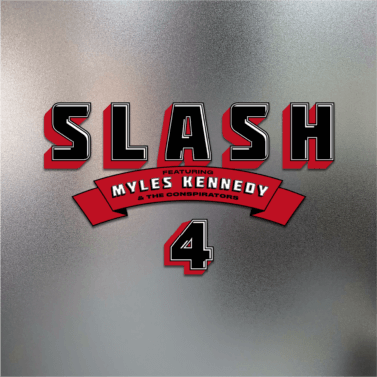Bio

Slash Featuring Myles Kennedy and The Conspirators: ‘4’
It’s been a decade since Slash Featuring Myles Kennedy and The Conspirators released their debut album together, 2012’s landmark Apocalyptic Love.
Ever since, the band – which, in addition to Slash and singer Myles Kennedy also includes bassist Todd Kerns, drummer Brent Fitz and rhythm guitarist Frank Sidoris – have been on one of the more impressive and unrelenting tears in rock ‘n’ roll, issuing two more hard-hitting, highly-acclaimed records (2014’s sprawling World On Fire and the more streamlined 2018 effort Living the Dream), and rocking stages all over the world, from North America to Southeast Asia, Europe and the U.K. to Australia and New Zealand, the Middle East and Russia to China, Japan, South Korea and beyond.
But for all they’ve done and everywhere they’ve gone, when it comes to Slash Featuring Myles Kennedy and The Conspirators, there’s always new musical boundaries to push and fresh creative avenues to explore.
Enter 4, the brand-new and highly anticipated studio effort from SMKC. True to the band’s expanding legacy, it’s everything you’ve come to expect from Slash, Myles, Todd, Brent and Frank… but also unlike anything you’ve heard from them yet. This time out, Slash says, they captured a certain “magic” – the sound of five musicians and band mates listening to and playing off one another in the spirit of live, in-the-moment collaboration.
It has a very spontaneous, fun kind of thing to it, and I love that,” Slash says of 4. “That’s really the major difference on this record – we did it more or less live, and the mistakes are all in there. It’s the sound of the five of us just jamming together in one room.” Of course, he continues, “you can make an amazing album by recording the bass and drums and putting the guitars on later and all that. But when you can capture that live rock ‘n’ roll spirit? It makes the whole thing really special.”
And make no mistake: 4 is special. The album kicks off with the six-string clarion call of Slash’s Gibson Les Paul, which cuts through the mix like a siren forewarning what’s to come – in this case, opening track “The River is Rising,” one of the band’s toughest and most dynamic compositions to date. Unraveling via a menacing, tightly coiled riff and deep-in-the-pocket groove, the song builds to a trademark SMKC widescreen chorus, featuring Kennedy’s vocals riding over waves of guitar melody, before stopping on a dime to break into a furious double-time instrumental sprint, with Slash’s frenzied, nimble solo racing above, around, alongside and within his band mates’ full-throttle rhythm gallop. “It grabs you right out of the gate,” Slash says.
And from the chunky, deliberate stomp of “Whatever Gets You By” to the slinky grooves and talk box-drenched guitar hooks of “C’est La Vie,” the anthemic swell of “The Path Less Followed” to the cowbell-inflected boogie-shake of “Actions Speak Louder Than Words,” and the grimy Aerosmith-esque funk of “April Fool” to the rampaging attack of “Call Off the Dogs,” 4 never lets go.
To be sure, this is SMKC like you’ve never heard them before.
Need more evidence? See, for starters, the exotica-tinged “Spirit Love,” which is introduced by a snaky Slash single-note theme played on an electric sitar (but don’t worry – it’s still run through “a Marshall at full blast,” Slash assures) and then erupts into a psychedelic fever dream fueled by a crushing, circular riff. Says Kennedy, “Every time I hear the song I see, like, a cobra dancing in front of a snake charmer.”
Or, on the other end of the sonic spectrum, the bright-toned pop-rocker “Fill My World,” a heart-on-sleeve love song – even if, Kennedy admits, it’s a love song about his dog – that blooms with irresistible major-key melodies and one of Slash’s most liquid and expressive solos to date.
Or album closer “Fall Back to Earth,” a six-minute “epic,” to use Slash’s word, awash in cinematic soundscapes and dramatic tonal shifts, and anchored by an indelible, at this point practically trademark, Slash guitar hook.
Throughout, 4 hits on a wide range of sounds, styles and moods, and does it all with laser-sharp musical focus and a lightning-in-a-bottle sense of immediacy.
“Everybody went into with the mindset of, ‘Okay, the red button’s being pressed, the tape machine is rolling. Just do your best and don’t screw up!’” Kennedy says with a laugh.
He likens the process to creating a sonic snapshot: “You’re documenting a moment in time and letting things kind of fall where they may. It’s a different approach, but a very human one.”
That “different approach” is just one of several ways SMKC changed things up this time out. Whereas the band recorded their previous two records in L.A. with Michael “Elvis” Baskette, for 4 they opted to relocate to Nashville to work with Grammy-winning producer Dave Cobb, known for helming rock and country projects from the likes of Chris Stapleton, Jason Isbell, Rival Sons, and Shooter Jennings, among others.
“Dave and I had this great conversation where we talked about [famed producer and engineer] Glyn Johns and recording live and spontaneity and first and second takes – all this stuff that’s right up my alley,” Slash says. “Based on that conversation, I said, ‘Let’s do this.’”
The experience was, Slash continues, “really unique.” For starters, he says, “we had to get to Nashville during the pandemic, and safely. So, I figured, ‘Well, we’ll just take a tour bus.’ Which was an adventure unto itself.”
Kennedy picks up the story. “We were trying to be really careful given that things were still pretty risky. So, we met up in Las Vegas, and before we got on the bus, we all got tested. Then when we got off the bus in Nashville we tested again. Before we stepped through the studio doors, we tested again. We had all these protocols in place.”
The sessions for 4, which took place in Nashville’s legendary RCA Studio A – “it’s this huge, historic room that used to be Chet Atkins’ studio,” Slash says – moved quickly.
“I remember the day before we went in, one of Dave Cobb’s assistant engineers said, “Oh, you guys will be recording by tomorrow night,’” Kennedy recalls. “And I was like, really?”
Really.
“That first day, we came in, lined the backline up with a couple of baffles and started recording live, just like that,” Slash says. “We recorded two songs a day – vocals, guitars, bass and drums – and we kept everything. Dave just let us do our thing.”
Within a week, the band had roughly 90% of the music recorded. But everything came to a screeching halt when Kennedy tested positive for Covid-19. “I was the first to go down,” the singer says. In short order, Kerns, Fitz and one of the house engineers followed suit.
“We were staying in an Airbnb in Nashville, and everybody had to go into quarantine,” Slash recalls. “And I was sitting there going, ‘Maybe I should check into a hotel?’ But I wasn’t going to abandon my band just because they got sick.”
Instead, they simply moved the sessions to the Airbnb. “I ended up having to finish three of the vocals – ‘Spirit Love,’ ‘Whatever Gets You By’ and ‘Fall Back to Earth’ – in the pool house,” Kennedy says. “I tracked my vocals on my laptop, and then Todd came in and did all the backing vocals there, too. Then we sent the files to Dave at the studio.”
Slash, for his part, finished up guitar overdubs at RCA Studio. And despite his best efforts, he eventually tested positive for Covid as well. In fact, Sidoris was the only Conspirator who managed to escape infection. “So, I sent him home,” Slash says, then laughs. “I was like, ‘You don’t have anything else to do anyway, get out of here. Stay away from this god forsaken place!’”
He continues, “It really was this whole crisis period. But we all went through it together, so in a way it was also a great bonding experience.”
That experience is reflected, quite forthrightly, in the sound of 4. “When I listen to a song like ‘The River is Rising,’ by that point I was starting to get pretty sick,” Kennedy says. “You can hear it in my voice, how congested I was. But that’s part of what I think is really interesting about this record. We just let those imperfections lay. Because it’s all part of the story.”
It’s a story that, ten years in, only continues to progress. “The thing about this group is it started out in one place, and it’s evolved ever since,” Slash says. “And just when it seems like it’s reaching a certain place, without really giving it much thought we’ll get together and naturally move on to another place from there.”
Which is certainly evident with 4. “I feel like in a lot of ways it’s a continuation of what we do, but because of the way that it was recorded it’s also a progression,” Kennedy says. “The songs were being captured and viewed through a different prism that helped redefine the sound.”
And keep going they will. “I think we’re all kind of amazed and pleasantly surprised that after a decade we’re still making records and we’re all still in it,” Kennedy continues. “But that’s because we do love what we’re doing, and we really do like each other.” He laughs. “It may not be as exciting as watching people fistfight onstage, but it’s certainly something where people know that we’re in it for the long haul.”
Slash concurs. “The Conspirators is just such a simple, easy band, and it’s been like that from its inception. It’s a band where everybody just wants to get together and play, and there’s really not a lot of other stuff that gets in the way. We get the material together and we go for it, and once a run’s over, then we go and do other things.”
“But we always come back to it,” Slash continues, “because we love making these records and doing the tours and going out and having a really good time. And as low pressure as that is, it’s also super, super important to have that. We do it, and it’s fun. And that’s why we’ll continue to do it.”
